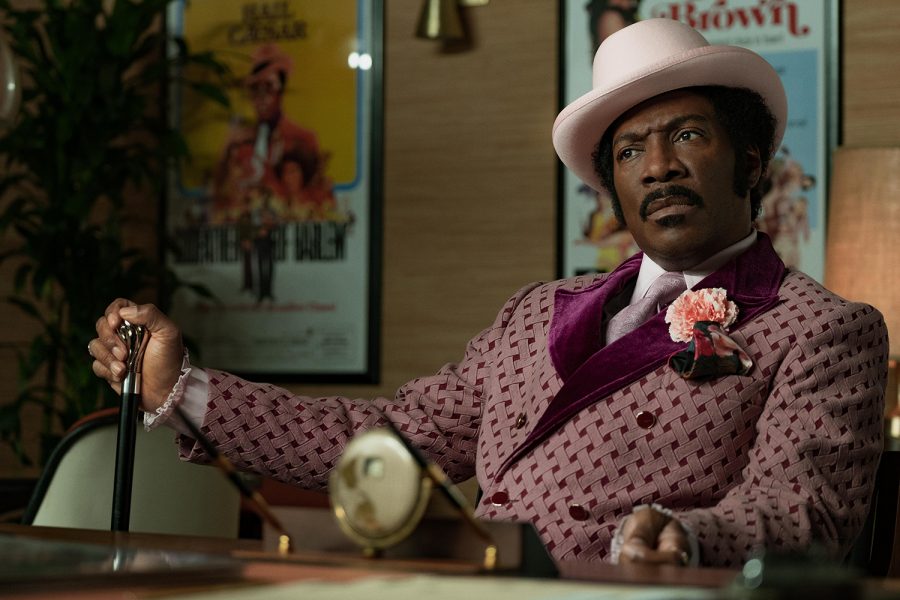Opinion: Dolemite Is My Name dances the line between blaxploitation and empowerment
The film unveils the making of black exploitation and how cinema can be truly subjective.
Eddie Murphy stars as Rudy Ray Moore, a struggling performer who strikes it big with a larger-than-life persona in "Dolemite is My Name." [Netflix]
October 29, 2019
Admittedly, I was unable to grasp the draw of Dolemite Is My Name before watching the film — having seen the trailer dozens of times — but I allowed myself to be swept up into the story, and I left with an intriguing and almost entertaining glimpse into cinematic history. Plus, the iconic Eddie Murphy reprises his fame as the legendary performer Rudy Ray Moore.
Although riddled with stereotypes of African Americans and their culture, Dolemite Is My Name stands up against people who tell you no, the importance of chasing your dreams, and the profound effect of seeing yourself on screen.
“Blaxploitation is more than stereotypes that are perceived to bring down the black race and their respectability,” University of Iowa cinematic-arts Professor Christopher Harris said. “These films are time capsules of long-standing political strands.”
Based on a true story, the movie is set in the 1970s and revolves around the build-up, shooting, and the aftermath of the blaxploitation film Dolemite. Murphy leads a star-studded cast as he immerses himself into the larger-than-life comedian, musician, singer, film actor, and producer.
Yet, the film stumbles across thin lines between its attempts at humor, moments of tenderness, and the often-uncomfortable depictions of race that director Craig Brewer doesn’t quite seem to understand himself.
The film stumbles across thin lines between its attempts at humor, moments of tenderness, and the often-uncomfortable depictions of race.
Harris truly appreciates Dolemite Is My Name for two reasons: the heart and tenderness between Moore and Da’Vine Joy Randolph’s Lady Reed, and the brilliant comedic acting. He even points to when Moore is in the theater watching the critically acclaimed The Front Page, admiring the social commentary of how humor can be specific to class and race.
From the opening scene of Dolemite Is My Name, the R-rating is dutifully earned by how fast the colorful range of curse words fly around the record store. Profanity continues throughout the movie. It also goes on to make sweeping generalizations about what black people find entertaining, depicting the black community as only finding humor in vulgarity.
Standing outside of the theater after watching the film, Moore is disappointed in the poor quality of cinema that has reached such a mass audience. This is when the idea is born to make his own movie full of gratuitous sex and violence. Moore believes this is what people will pay to see on the big screen.
According to an Encyclopedia Britannica article by Yvonne Sims, during the early 1970s, more than 200 blaxploitation films broke existing stereotypes by “presenting self-possessed black men (and occasionally women) in control of their own destinies.”
This was demonstrated through Moore’s infectious resilience and ambition to be a star, as well as Reed’s embodiment of strong female energy. These are in strict accordance to the film’s tagline, “Make your own legend.”
However, the definition of blaxploitation doesn’t end there.
“African American critics found the stereotypes made possible by the behaviors of the heroes and heroines of the films — which often included drug dealing, violence, and easy sex — be the most pervasive and damaging effect of the movies,” Sims wrote.
But more often than not, the messages of cinema lie within the minds of the audience, up to the interpretation of our own experiences, passions, and movie tastes.
“I was a teenager in the 1970s,” Harris said. “So even if the film is just halfway decent, I will always have a soft spot for the nostalgia.”
Columns reflect the opinions of the authors and are not necessarily those of the Editorial Board, The Daily Iowan, or other organizations in which the author may be involved.


















